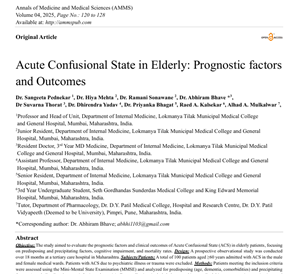Acute Confusional State in Elderly: Prognostic factors and Outcome
Authors
##plugins.themes.bootstrap3.article.main##
Abstract
Objective: The study aimed to evaluate the prognostic factors and clinical outcomes of Acute Confusional State (ACS) in elderly patients, focusing on predisposing and precipitating factors, cognitive impairment, and mortality rates. Design: A prospective observational study was conducted over 18 months at a tertiary care hospital in Maharashtra. Subjects/Patients: A total of 100 patients aged ≥60 years admitted with ACS in the male and female medical wards. Patients with ACS due to psychiatric illness or trauma were excluded. Methods: Patients meeting the inclusion criteria were assessed using the Mini-Mental State Examination (MMSE) and analyzed for predisposing (age, dementia, comorbidities) and precipitating factors (metabolic disturbances, infections, hypoxia). Data collection included demographics, medical history, systemic examination, and laboratory investigations. Statistical analysis was performed using SPSS software. Results: The most common predisposing factors were hypertension (59%), diabetes (47%), and dementia (9%). Metabolic disturbances (49%) and hypoxia (37%) were the leading precipitating factors. ICU admission was required in 74% of cases. The mortality rate was 33%, with 67% of patients discharged. Conclusion: ACS in the elderly is associated with high morbidity and mortality, emphasizing the need for early identification and targeted management of risk factors to improve clinical outcomes.
##plugins.themes.bootstrap3.article.details##
Copyright (c) 2025 Sangeeta Pednekar, Hiya Mehta, Ramani Sonawane, Abhiram Bhave, Suvarna Thorat, Dhirendra Yadav, Priyanka Bhagat, Raed A. Kalsekar, Alhad A. Mulkalwar

This work is licensed under a Creative Commons Attribution 4.0 International License.
Creative Commons License All articles published in Annals of Medicine and Medical Sciences are licensed under a Creative Commons Attribution 4.0 International License.
Hiya Mehta, Junior Resident, Department of Internal Medicine, Lokmanya Tilak Municipal Medical College and General Hospital, Mumbai, Maharashtra, India.
Junior Resident, Department of Internal Medicine, Lokmanya Tilak Municipal Medical College and General Hospital, Mumbai, Maharashtra, India.
Ramani Sonawane, Junior Resident, Department of Internal Medicine, Lokmanya Tilak Municipal Medical College and General Hospital, Mumbai, Maharashtra, India.
Junior Resident, Department of Internal Medicine, Lokmanya Tilak Municipal Medical College and General Hospital, Mumbai, Maharashtra, India.
Dhirendra Yadav, Assistant Professor, Department of Internal Medicine, Lokmanya Tilak Municipal Medical College and General Hospital, Mumbai, Maharashtra, India.
Assistant Professor, Department of Internal Medicine, Lokmanya Tilak Municipal Medical College and General Hospital, Mumbai, Maharashtra, India.
Priyanka Bhagat, Senior Resident, Department of Internal Medicine, Lokmanya Tilak Municipal Medical College and General Hospital, Mumbai, Maharashtra, India.
Senior Resident, Department of Internal Medicine, Lokmanya Tilak Municipal Medical College and General Hospital, Mumbai, Maharashtra, India.
Raed A. Kalsekar, 3rd Year Undergraduate Student, Seth Gordhandas Sunderdas Medical College and King Edward Memorial Hospital, Mumbai, Maharashtra, India.
3rd Year Undergraduate Student, Seth Gordhandas Sunderdas Medical College and King Edward Memorial Hospital, Mumbai, Maharashtra, India.
Alhad A. Mulkalwar, Tutor, Department of Pharmacology, Dr. D.Y. Patil Medical College, Hospital and Research Centre, Dr. D.Y. Patil Vidyapeeth (Deemed to be University), Pimpri, Pune, Maharashtra, India.
Tutor, Department of Pharmacology, Dr. D.Y. Patil Medical College, Hospital and Research Centre, Dr. D.Y. Patil Vidyapeeth (Deemed to be University), Pimpri, Pune, Maharashtra, India.
[1] Fortini A, Morettini A, Tavernese G, Facchini S, Tofani L, Pazzi M. Delirium in elderly patients hospitalized in internal medicine wards. Intern Emerg Med. 2014 Jun;9(4):435-41.
[2] Inouye SK, Rushing JT, Foreman MD, Palmer RM, Pompei P. Does delirium contribute to poor hospital outcomes?: A three-site epidemiologic study. J Gen Intern Med. 1998 Mar;13(4):234-42.
[3] Nagase M, Okamoto Y, Tsuneto S, Tanimukai H, Matsuda Y, Okishiro N, et al. A Retrospective Chart Review of Terminal Patients with Cancer with Agitation and Their Risk Factors. Journal of Palliative Medicine. 2012 Nov;15(11):1185-90.
[4] Kim H, Chung S, Joo YH, Lee JS. The major risk factors for in a clinical setting. Neuropsychiatric Disease and delirium Treatment. :7.
[5] Elie M, Cole MG, Primeau FJ, Bellavance F. Delirium risk factors in elderly hospitalized patients. J Gen Intern Med. 1998 Mar;13(3):204-12.
[6] Lee J, Chung S, Joo Y, Kim H. The major risk factors for delirium in a clinical setting. NDT. 2016 Jul;Volume 12:1787-93.
[7] Jayaswal A, Sampath H, Soohinda G, Dutta S. Delirium in medical intensive care units: Incidence, subtypes, risk factors, and outcome. Indian J Psychiatry. 2019;61(4):352.
[8] Magny E, Le Petitcorps H, Pociumban M, Bouksani-Kacher Z, Pautas É, Belmin J, et al. Predisposing and precipitating factors for delirium in community-dwelling older adults admitted to hospital with this condition: A prospective case series. Marengoni A, editor. PLoS ONE. 2018 Feb 23;13(2):e0193034.
[9] Andrew, M.K., Freter, S.H. & Rockwood, K. Incomplete functional recovery after delirium in elderly people: a prospective cohort study. BMC Geriatr 5, 5 (2005). https://doi.org/10.1186/1471-2318-5-5
[10] Rockwood K, Cosway S, Carver D, Jarrett P, Stadnyk K, Fisk J. The risk of dementia and death after delirium. Age Ageing. 1999 Oct;28(6):551-6. doi: 10.1093/ageing/28.6.551. PMID: 10604507.
[11] Rosgen BK, Krewulak KD, Stelfox HT, Ely EW, Davidson JE, Fiest KM. The association of delirium severity with patient and health system outcomes in hospitalised patients: a systematic review. Age Ageing. 2020 Jul 1;49(4):549-557. doi: 10.1093/ageing/afaa053. PMID: 32342978; PMCID: PMC7331098.
[12] Yoshimura, A., Goodson, C., Johns, J.T. et al. Altered cortical brain activity in end stage liver disease assessed by multi-channel near- infrared spectroscopy: Associations with delirium. Sci Rep 7, 9258 (2017). https://doi.org/10.1038/s41598-017-10024-7
[13] Jäckel, M., Aicher, N., Rilinger, J. et al. Incidence and predictors of delirium on the intensive care unit in patients with acute kidney injury, insight from a retrospective registry. Sci Rep 11, 17260 (2021). https://doi.org/10.1038/s41598-021-96839-x
[14] Kuswardhani RAT, Sugi YS. Factors Related to the Severity of Delirium in the Elderly Patients with Infection. Gerontology and Geriatric Medicine. January 2017. doi:10.1177/2333721417739188

